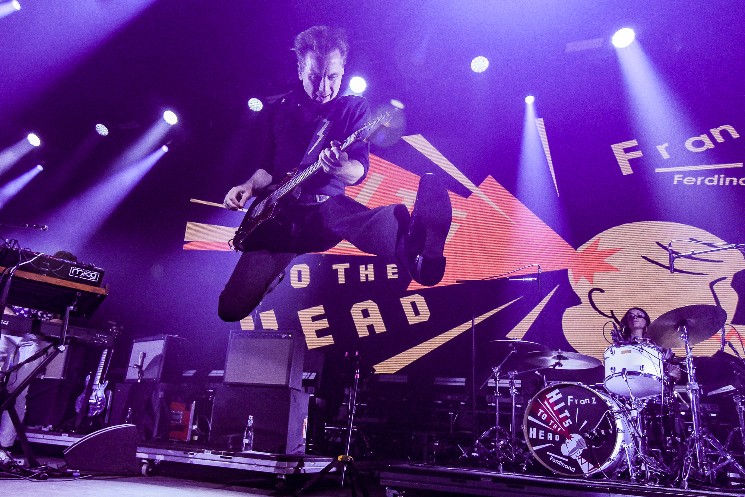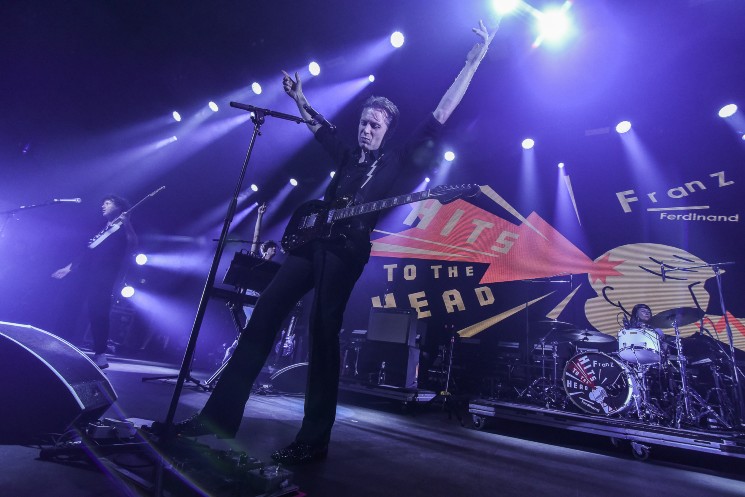At some point in every rock fan's life, you must ask yourself a horrifying question: "What is the music from my childhood doing on the classic rock station?!"
As the greatest hits compilations and deluxe anniversary reissues from '00s artists — and tweets manufacturing outrage over the Killers' "classic rock" designation — get more and more frequent, it's starting to dawn on many millennials that our time has finally come: the music we grew up with now bears more in common with the increasingly vast canon of "influences" than the defining artefacts of today's cultural moment. Someone has unironically designated these artists as for "the olds." We have become what we most fear: "retro."
For me, Franz Ferdinand's Hits to the Head tour tipped the scales.
When the band first formed in Glasgow in 2001, their North American counterparts were pretending not to care, delivering memorable riffs and acerbic vocals with an effortlessly cool, laidback shrug. Meanwhile, Franz took a showy, often silly, new-wavey approach, with meaningless refrains that only served to give listeners something catchy to sing along to (yes, meaningless — as far as I'm concerned, "doot doo, doot-doo doo-da doo-doo" are official lyrics from "Do You Want To," to say nothing of the German gibberish that closes out debut single "Darts of Pleasure"). Their full-throated, earnest take on the rock music dominating the underground gave them mainstream commercial appeal, with two Billboard-charting singles ("Take Me Out" and "Do You Want To," of course), both of which charted higher than the Strokes' lone contender, "Juicebox."
The 20th anniversaries of their instant-classic self-titled debut album and less consistent but still hit-filled ("The Fallen," anyone?) follow-up You Could Have It So Much Better are only two and three years away, respectively, and while they're bound to yield the inevitable reissues, thinkpieces and commemorative tours, Franz jumped the gun, going full-speed into nostalgia mode for a broader array of bangers. Earlier this year, they released career-spanning compilation Hits to the Head, and while your opinion may vary on the practice as a whole (I find them generally archaic in this age of Peak Playlist, especially for a band like Franz Ferdinand who have a surprising amount of depth in their back catalogue), it made for a great tour.

This version of Franz Ferdinand ticks all the classic rock boxes: an ageless lead singer (seriously, Alex Kapranos, what are your secrets?) flanked by a cabal of talented but ultimately interchangeable new bandmates two-thirds his age and at least one other stalwart original (shout out to bassist Bob Hardy). It's impossible to try to top the collective excitement of the first notes of those aforementioned Billboard-charting singles (yes, "Take Me Out" and "Do You Want To" were amazing, but you already knew that), but the band showed off tons of that also-aforementioned depth throughout most of last night's Hits to the Head stop at History in Toronto, a testament to where they are right now and where they're going to be for a long time — rightfully viewed as one of their generation's most iconic and enduring rock acts.
Since there was no real album to promote, Franz were able to focus on what made them famous: songs that simultaneously embodied the nightclub and the hangover, the mix of self-serious post-punk and lighthearted new wave that paved the way for indie sleaze. Many of the band's second-tier standouts, which would have been on the bubble of setlists geared toward selling new records, got their time to shine in Toronto, including "Michael" (which served as a queer awakening anthem for at least two Exclaim! staffers) and "Ulysses" and "No You Girls" from 2009's underrated dancefloor heater (though undeniably momentum-killing) Tonight.
They also made the case for the newer inclusions. Sometimes it worked: songs from 2013's Right Thoughts, Right Words, Right Action maintained the energy due to the calls and responses of "Evil Eye" ("It's red, ya bastard!" and "Not me!") and the many solos of "Love Illumination" that gave the new members time to shine, first with Julian Corrie's behind-the-back keyboard lines and the song-ending guitar duel between Kapranos and Dino Bardot. (The third new addition, drummer Audrey Tait, had her moment at the end, which we'll get to, but she was crucial throughout as she held down the backline.) Not so much for latest additions like "Always Ascending" (the title track from their largely forgettable 2018 album) and Hits on the Head's "Billy Goodbye" and "Curious" (committing the cardinal sin of greatest hits compilations: including new material that would have been filler on any of their regular albums), which lacked familiarity and theatricality, with no new arrangements or memorable moments to give them a lifeline. (Also, those three every night and not a single "Auf Achse"? Really?!)
But going through these motions is what classic rock is all about. Beyond being a radio format, it's not a genre, sound or movement — it's an honour, really; an acknowledgment that the hits are timeless enough to warrant a sustained reaction decades removed from any context. Sure, any zeitgeist-capturing single can ignite the dancefloor years later with the right audience, but Franz Ferdinand are more than a one- or two-hit wonder, as the crowd of 2000-or-so in Toronto proved all night long. The band could never make a new song again and would still fill sizeable venues all over the world for the next 20 years on the strength of their hits alone (not that their stakeholders would ever let them).

Plus, those hits aren't the only strength of the live set. Kapranos can still stride, jump and kick across the stage with swagger, and command the crowd simply by waving his arms, injecting most songs with audience engagement to maintain that vital sense of connection. Not that Franz will likely approach, say, Rolling Stones-sized stadium territory, but their video backdrop and aforementioned solos definitely added that extra punch of stage presence. The main set ended with a fun, full-band percussive outro to "Outsiders" that let Tait wild out at centre stage while the boys hammed it up at the back on her kit, and plenty of songs were given lengthy breakdowns and endings (not always, though the minor bummer of the band deciding to skip the acid techno outro of "Lucid Dreams" was instantly negated by the iconic opening chord of "Take Me Out"). And while the three-song encore started off slow with the early Elton John-esque "Billy Goodbye," one of those frustrating Hits to the Head newbies, it took off with "The Fallen" and peaked with "This Fire."
As Kapranos conducted the crowd into a crouch during the final extended breakdown of the final song of the night, I took a look around me, at the people struggling to get low due to skinny jeans or bad knees (or, if you're like me, both). After singing at the top of my lungs to songs that had followed me for most of my life, I was met with the sudden peace of realizing that it was okay to have my favourites rezoned into the retirement halls of classic rock. It's not about staying young and relevant and cool and hip forever — but it's about liking what you like, keeping the good times going as long as you can, and knowing when to pass the torch.
And with that, I — and everyone else — exploded into mania for one last indie sleaze-y dance party at the tame hour of 10:15 p.m. before heading home for a reasonable bedtime. Franz Ferdinand will probably be back soon, new album in tow, and if we're lucky, it will have one song on it that people will care about three years later. And that's totally fine — they've had their world-dominating moment, and it continues to make an impact on those who were there and those who are joining the party wondering how people discovered new music before Spotify. Because to be remembered for having changed the world — rather than be acclaimed for the potential to change it — is better than not being remembered at all.
As the greatest hits compilations and deluxe anniversary reissues from '00s artists — and tweets manufacturing outrage over the Killers' "classic rock" designation — get more and more frequent, it's starting to dawn on many millennials that our time has finally come: the music we grew up with now bears more in common with the increasingly vast canon of "influences" than the defining artefacts of today's cultural moment. Someone has unironically designated these artists as for "the olds." We have become what we most fear: "retro."
For me, Franz Ferdinand's Hits to the Head tour tipped the scales.
When the band first formed in Glasgow in 2001, their North American counterparts were pretending not to care, delivering memorable riffs and acerbic vocals with an effortlessly cool, laidback shrug. Meanwhile, Franz took a showy, often silly, new-wavey approach, with meaningless refrains that only served to give listeners something catchy to sing along to (yes, meaningless — as far as I'm concerned, "doot doo, doot-doo doo-da doo-doo" are official lyrics from "Do You Want To," to say nothing of the German gibberish that closes out debut single "Darts of Pleasure"). Their full-throated, earnest take on the rock music dominating the underground gave them mainstream commercial appeal, with two Billboard-charting singles ("Take Me Out" and "Do You Want To," of course), both of which charted higher than the Strokes' lone contender, "Juicebox."
The 20th anniversaries of their instant-classic self-titled debut album and less consistent but still hit-filled ("The Fallen," anyone?) follow-up You Could Have It So Much Better are only two and three years away, respectively, and while they're bound to yield the inevitable reissues, thinkpieces and commemorative tours, Franz jumped the gun, going full-speed into nostalgia mode for a broader array of bangers. Earlier this year, they released career-spanning compilation Hits to the Head, and while your opinion may vary on the practice as a whole (I find them generally archaic in this age of Peak Playlist, especially for a band like Franz Ferdinand who have a surprising amount of depth in their back catalogue), it made for a great tour.

This version of Franz Ferdinand ticks all the classic rock boxes: an ageless lead singer (seriously, Alex Kapranos, what are your secrets?) flanked by a cabal of talented but ultimately interchangeable new bandmates two-thirds his age and at least one other stalwart original (shout out to bassist Bob Hardy). It's impossible to try to top the collective excitement of the first notes of those aforementioned Billboard-charting singles (yes, "Take Me Out" and "Do You Want To" were amazing, but you already knew that), but the band showed off tons of that also-aforementioned depth throughout most of last night's Hits to the Head stop at History in Toronto, a testament to where they are right now and where they're going to be for a long time — rightfully viewed as one of their generation's most iconic and enduring rock acts.
Since there was no real album to promote, Franz were able to focus on what made them famous: songs that simultaneously embodied the nightclub and the hangover, the mix of self-serious post-punk and lighthearted new wave that paved the way for indie sleaze. Many of the band's second-tier standouts, which would have been on the bubble of setlists geared toward selling new records, got their time to shine in Toronto, including "Michael" (which served as a queer awakening anthem for at least two Exclaim! staffers) and "Ulysses" and "No You Girls" from 2009's underrated dancefloor heater (though undeniably momentum-killing) Tonight.
They also made the case for the newer inclusions. Sometimes it worked: songs from 2013's Right Thoughts, Right Words, Right Action maintained the energy due to the calls and responses of "Evil Eye" ("It's red, ya bastard!" and "Not me!") and the many solos of "Love Illumination" that gave the new members time to shine, first with Julian Corrie's behind-the-back keyboard lines and the song-ending guitar duel between Kapranos and Dino Bardot. (The third new addition, drummer Audrey Tait, had her moment at the end, which we'll get to, but she was crucial throughout as she held down the backline.) Not so much for latest additions like "Always Ascending" (the title track from their largely forgettable 2018 album) and Hits on the Head's "Billy Goodbye" and "Curious" (committing the cardinal sin of greatest hits compilations: including new material that would have been filler on any of their regular albums), which lacked familiarity and theatricality, with no new arrangements or memorable moments to give them a lifeline. (Also, those three every night and not a single "Auf Achse"? Really?!)
But going through these motions is what classic rock is all about. Beyond being a radio format, it's not a genre, sound or movement — it's an honour, really; an acknowledgment that the hits are timeless enough to warrant a sustained reaction decades removed from any context. Sure, any zeitgeist-capturing single can ignite the dancefloor years later with the right audience, but Franz Ferdinand are more than a one- or two-hit wonder, as the crowd of 2000-or-so in Toronto proved all night long. The band could never make a new song again and would still fill sizeable venues all over the world for the next 20 years on the strength of their hits alone (not that their stakeholders would ever let them).

Plus, those hits aren't the only strength of the live set. Kapranos can still stride, jump and kick across the stage with swagger, and command the crowd simply by waving his arms, injecting most songs with audience engagement to maintain that vital sense of connection. Not that Franz will likely approach, say, Rolling Stones-sized stadium territory, but their video backdrop and aforementioned solos definitely added that extra punch of stage presence. The main set ended with a fun, full-band percussive outro to "Outsiders" that let Tait wild out at centre stage while the boys hammed it up at the back on her kit, and plenty of songs were given lengthy breakdowns and endings (not always, though the minor bummer of the band deciding to skip the acid techno outro of "Lucid Dreams" was instantly negated by the iconic opening chord of "Take Me Out"). And while the three-song encore started off slow with the early Elton John-esque "Billy Goodbye," one of those frustrating Hits to the Head newbies, it took off with "The Fallen" and peaked with "This Fire."
As Kapranos conducted the crowd into a crouch during the final extended breakdown of the final song of the night, I took a look around me, at the people struggling to get low due to skinny jeans or bad knees (or, if you're like me, both). After singing at the top of my lungs to songs that had followed me for most of my life, I was met with the sudden peace of realizing that it was okay to have my favourites rezoned into the retirement halls of classic rock. It's not about staying young and relevant and cool and hip forever — but it's about liking what you like, keeping the good times going as long as you can, and knowing when to pass the torch.
And with that, I — and everyone else — exploded into mania for one last indie sleaze-y dance party at the tame hour of 10:15 p.m. before heading home for a reasonable bedtime. Franz Ferdinand will probably be back soon, new album in tow, and if we're lucky, it will have one song on it that people will care about three years later. And that's totally fine — they've had their world-dominating moment, and it continues to make an impact on those who were there and those who are joining the party wondering how people discovered new music before Spotify. Because to be remembered for having changed the world — rather than be acclaimed for the potential to change it — is better than not being remembered at all.
